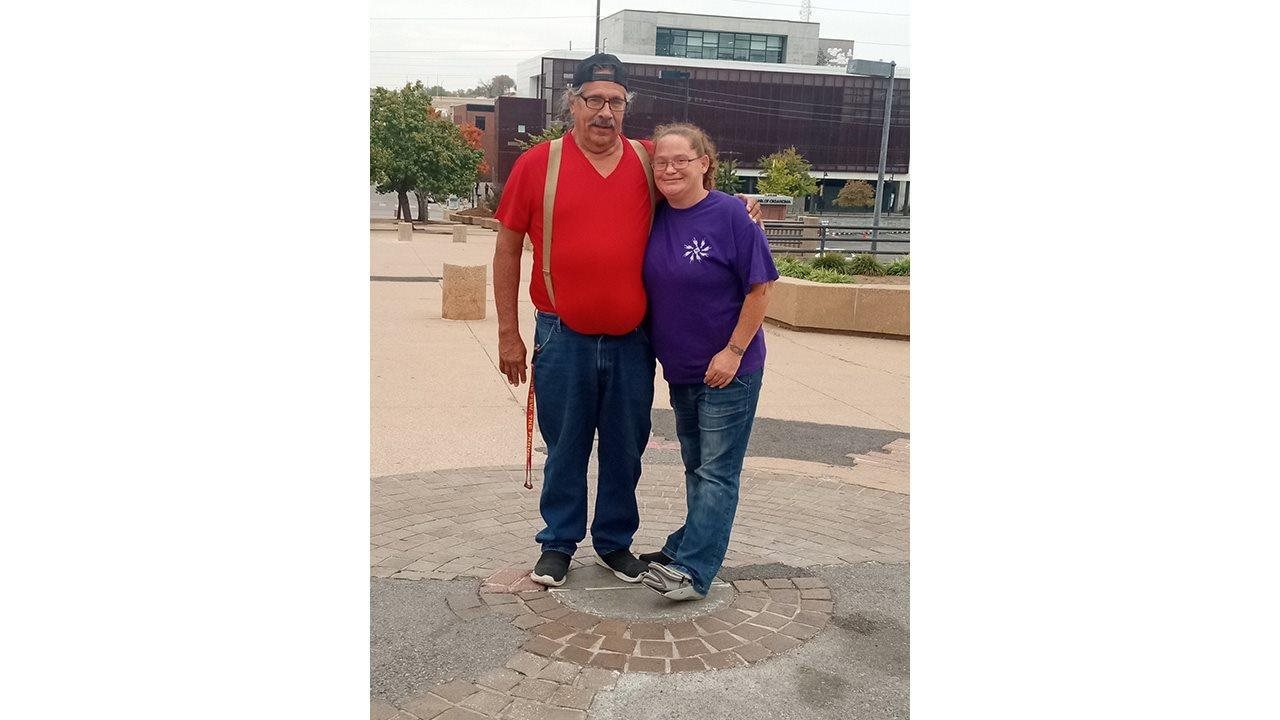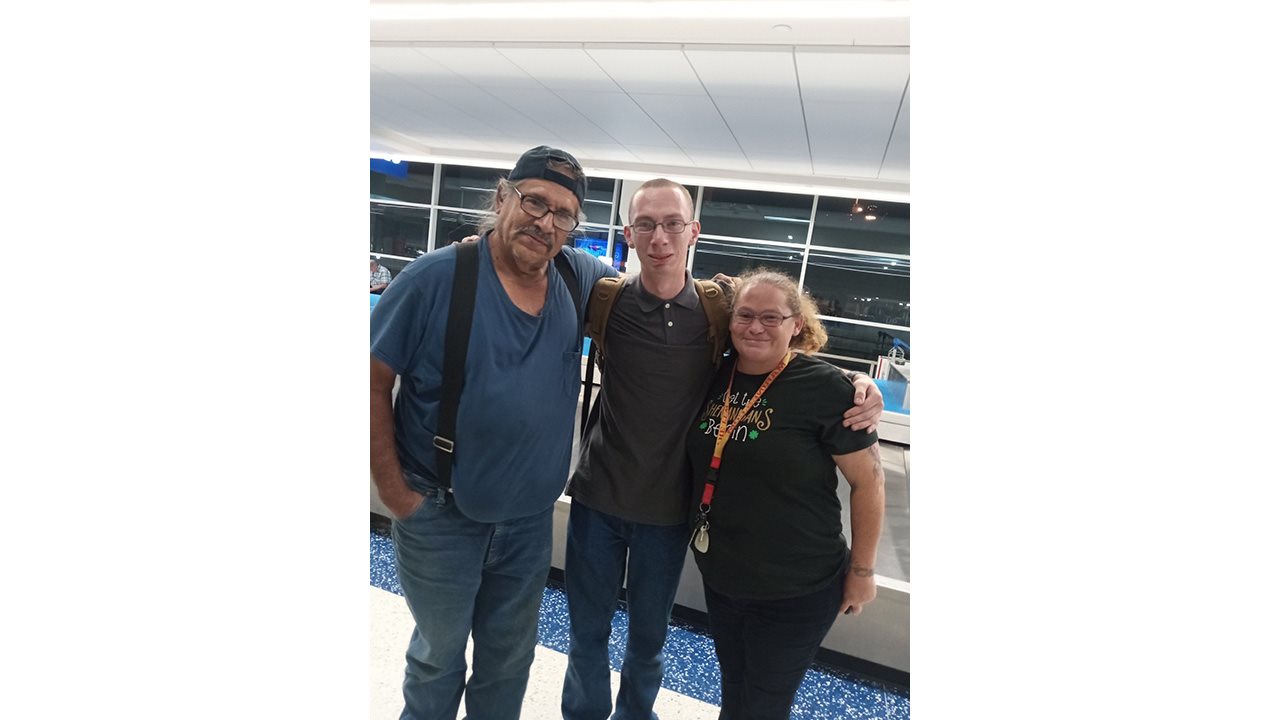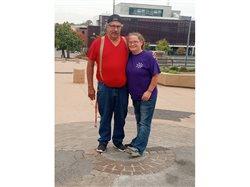Facing Unresectable Hepatocellular Carcinoma (uHCC) Together: A Caregiver’s Journey
Posted: July 16, 2025 | Word Count: 2,059

Tucked in the scenic hills of Tuskahoma, Oklahoma, Korrin S., her son, and her fiancé Manuel H. have carved out a life centered around the things they love—fishing, hunting, and playing video games together.
Over the last six years, they have supported each other through life's ups and downs. Then, their routine was upended after what seemed like a simple doctor's visit for Manuel's leg cramps. A routine blood test revealed elevated liver enzymes—a concerning development for Manuel, who previously had been diagnosed with Hepatitis C, a blood-borne infection known to cause liver damage and a common risk factor for liver cancer.1 His doctor immediately referred him to an oncologist.
But getting a diagnosis wasn't straightforward. Despite undergoing two biopsies and multiple computed tomography (CT) scans, Manuel's results initially came back inconclusive. "It was very strange," Korrin recalled. "Then all of a sudden, the third biopsy came back, it was cancer." After months of testing and waiting, Manuel was diagnosed with Stage III unresectable hepatocellular carcinoma (uHCC), the most common form of liver cancer.2
Liver cancer is becoming increasingly common in the U.S., with about 43,000 diagnoses each year.3 Viral Hepatitis B virus (HBV) and Hepatitis C virus (HCV), non-alcoholic fatty liver disease (NAFLD) or non-alcoholic steatohepatitis (NASH), diabetes, heavy alcohol use, and tobacco use are all risk factors.1 Like Manuel, approximately 70% of people with hepatocellular carcinoma (HCC) learn their cancer is unresectable, meaning that surgically removing the tumor is no longer an option due to its size, location, or because of other health issues that make surgery unsafe.4
While Manuel took the news in stride, Korrin struggled with the weight of what lay ahead. "It was a shock. And I kept telling myself I didn't want to go through this again. I lost my first husband to illness."
As a next step to treat Manuel's uHCC, his oncologist recommended immunotherapy, a type of cancer treatment that uses the body's own immune system to help fight the disease.5
Manuel began treatment with the HIMALAYA Regimen: a combination of IMFINZI® (durvalumab) and IMJUDO® (tremelimumab-actl), a dual immunotherapy approach.6-8
IMJUDO in combination with IMFINZI is approved in the U.S. for the treatment of adult patients with uHCC.6,7
Before starting treatment, Manuel's oncologist explained the possible side effects that could occur while being treated with IMFINZI and IMJUDO—including lung and intestinal problems, and problems with your liver, hormone glands, kidney, skin, and pancreas.

Important information regarding IMFINZI
IMFINZI can cause your immune system to attack normal organs and tissues in your body and affect how they work. Side effects can sometimes become severe or life-threatening and can lead to death. These problems can occur at the same time and at any time during or after treatment. See your doctor right away if you experience cough, shortness of breath, chest pain, diarrhea or other stool changes, severe stomach pain or tenderness, severe nausea or vomiting, weight changes, increased hunger or thirst, constipation, dizziness or fainting, headaches, changes in urine, eye problems, irregular or rapid heartbeat, muscle pain or weakness, fever, rash, skin blistering, chills, itching or flushing, as this may keep these problems from becoming more serious.
These are not all the side effects associated with IMFINZI and IMJUDO. Please see Important Safety Information below for more information and full Prescribing Information, including Medication Guide, for IMFINZI and IMJUDO. Individual results may vary. Always talk to your healthcare provider with any questions.
Manuel's experience is his own and he is no longer taking IMFINZI and IMJUDO.
Korrin remembers feeling hopeful when they learned about this treatment. Still, Manuel's journey wasn't without challenges. His treatment center was located three hours away in Tulsa, meaning each infusion required a full-day trip. The cancer center's social worker helped ease the financial burden with gas cards, but there was an emotional toll on the couple as well.
"It's kind of a lonely road," Korrin admitted. "I don't have people to talk to, I don't have the support to be able to talk about my feelings and how scared I am."
Searching for connection and understanding, Korrin turned to Facebook support groups for people affected by uHCC. There, she found comfort, community, and first-hand stories that resonated in ways clinical explanations couldn't.
Korrin received helpful information from nurses and doctors and felt empowered by the research and learning she did on her own. "The more information I have, the better off I am," she said. She encourages everyone to learn more about the risk factors for uHCC, especially Hepatitis C.
Today, Korrin says the experience has brought her and Manuel closer than ever. "Embrace it. It's a hard thing to embrace, but try to enjoy these moments and make it all about them and not yourself," she shared.
Throughout this journey, Korrin has also learned the importance of self-care and its ability to allow her to in turn take care of Manuel. She frequently reminds other caregivers not to feel guilty about taking time for themselves.
She also maintains a positive attitude and leans on her faith. As Korrin looks back on this journey, she's focused on celebrating all she's gained from this journey with Manuel and her community.
IMPORTANT SAFETY INFORMATION
What is the most important information I should know about IMFINZI® (durvalumab) and IMJUDO® (tremelimumab-actl)?
IMFINZI and IMJUDO are medicines that may treat certain cancers by working with your immune system. IMFINZI and IMJUDO can cause your immune system to attack normal organs and tissues in any area of your body and can affect the way they work. These problems can sometimes become severe or life-threatening and can lead to death. You can have more than one of these problems at the same time. These problems may happen anytime during treatment or even after your treatment has ended.
Call or see your healthcare provider right away if you develop any new or worsening signs or symptoms, including:
Lung problems: cough, shortness of breath, and chest pain
Intestinal problems: diarrhea (loose stools) or more frequent bowel movements than usual; stools that are black, tarry, sticky, or have blood or mucus; and severe stomach-area (abdomen) pain or tenderness
Liver problems: yellowing of your skin or the whites of your eyes, severe nausea or vomiting, pain on the right side of your stomach area (abdomen), dark urine (tea colored), and bleeding or bruising more easily than normal
Hormone gland problems: headaches that will not go away or unusual headaches; eye sensitivity to light; eye problems; rapid heartbeat; increased sweating; extreme tiredness; weight gain or weight loss; feeling more hungry or thirsty than usual; urinating more often than usual; hair loss; feeling cold; constipation; your voice gets deeper; dizziness or fainting; and changes in mood or behavior, such as decreased sex drive, irritability, or forgetfulness
Kidney problems: decrease in your amount of urine, blood in your urine, swelling of your ankles, and loss of appetite
Skin problems: rash; itching; skin blistering or peeling; painful sores or ulcers in mouth or nose, throat, or genital area; fever or flu-like symptoms; and swollen lymph nodes
Pancreas problems: pain in your upper stomach area (abdomen), severe nausea or vomiting, and loss of appetite
Problems can also happen in other organs and tissues. These are not all of the signs and symptoms of immune system problems that can happen with IMFINZI and IMJUDO. Call or see your healthcare provider right away for any new or worsening signs or symptoms, which may include: Chest pain, irregular heartbeats, shortness of breath or swelling of ankles; confusion, sleepiness, memory problems, changes in mood or behavior, stiff neck, balance problems; tingling, numbness or weakness of the arms or legs; double vision, blurry vision, sensitivity to light, eye pain, changes in eye sight; persistent or severe muscle pain or weakness, muscle cramps, joint pain, joint stiffness or swelling; and low red blood cells and bruising
Infusion reactions that can sometimes be severe or life-threatening. Signs and symptoms of infusion reactions may include: chills or shaking, itching or rash, flushing, shortness of breath or wheezing, dizziness, feel like passing out, fever, and back or neck pain
Complications, including graft-versus-host disease (GVHD), in people who have received a bone marrow (stem cell) transplant that uses donor stem cells (allogeneic). These complications can be serious and can lead to death. These complications may happen if you underwent transplantation either before or after being treated with IMFINZI. Your healthcare provider will monitor you for these complications
Getting medical treatment right away may help keep these problems from becoming more serious. Your healthcare provider will check you for these problems during your treatment with IMFINZI and IMJUDO. Your healthcare provider may treat you with corticosteroid or hormone replacement medicines. Your healthcare provider may also need to delay or completely stop treatment with IMFINZI and IMJUDO if you have severe side effects
Before you receive IMFINZI and IMJUDO, tell your healthcare provider about all of your medical conditions, including if you:
- have immune system problems such as Crohn's disease, ulcerative colitis, or lupus
- have received an organ transplant
- have received or plan to receive a stem cell transplant that uses donor stem cells (allogeneic)
- have received radiation treatment to your chest area
- have a condition that affects your nervous system, such as myasthenia gravis or Guillain-Barré syndrome
- are pregnant or plan to become pregnant. IMFINZI and IMJUDO can harm your unborn baby
Females who are able to become pregnant - Your healthcare provider will give you a pregnancy test before you start treatment with IMFINZI and IMJUDO.
- You should use an effective method of birth control during your treatment and for 3 months after the last dose of IMFINZI and IMJUDO. Talk to your healthcare provider about birth control methods that you can use during this time.
- Tell your healthcare provider right away if you become pregnant or think you may be pregnant during treatment with IMFINZI and IMJUDO.
- are breastfeeding or plan to breastfeed. It is not known if IMFINZI and IMJUDO pass into your breast milk. Do not breastfeed during treatment and for 3 months after the last dose of IMFINZI and IMJUDO.
Tell your healthcare provider about all the medicines you take, including prescription and over-the-counter medicines, vitamins, and herbal supplements.
What are the possible side effects of IMFINZI and IMJUDO?
IMFINZI and IMJUDO can cause serious side effects (see above):
The most common side effects of IMFINZI and IMJUDO in adults with unresectable hepatocellular carcinoma (uHCC) include rash, diarrhea, feeling tired, itchiness, muscle or bone pain, and stomach (abdominal) pain.
Tell your healthcare provider if you have any side effect that bothers you or that does not go away. These are not all the possible side effects of IMFINZI and IMJUDO. Ask your healthcare provider or pharmacist for more information.
Call your doctor for medical advice about side effects. You may report side effects related to AstraZeneca products (Opens new window). If you prefer to report these to the FDA, either visit www.FDA.gov/medwatch or call 1-800-FDA-1088.
What are IMFINZI and IMJUDO?
IMFINZI is a prescription medicine used in combination with IMJUDO to treat adults with a type of liver cancer that cannot be removed by surgery (unresectable hepatocellular carcinoma or uHCC).
It is not known if IMFINZI and IMJUDO are safe and effective in children.
Please see Full Prescribing Information including Medication Guide for IMFINZI and IMJUDO.
References
1. American Cancer Society. Liver cancer risk factors. Accessed April 30, 2025. Available at: https://www.cancer.org/cancer/types/liver-cancer/causes-risks-prevention/risk-factors.html
2. American Cancer Society. What is liver cancer. Accessed April 30, 2025. Available at: https://www.cancer.org/cancer/types/liver-cancer/about/what-is-liver-cancer.html
3. WHO. Liver cancer fact sheet. Accessed April 30, 2025. Available at: https://gco.iarc.who.int/media/globocan/factsheets/cancers/11-liver-and-intrahepatic-bile-ducts-fact-sheet.pdf
4. Gholam PM, Iyer R, Johnson M. Multidisciplinary management of patients with unresectable hepatocellular carcinoma: a critical appraisal of current evidence. Cancers (Basel). 2019;11(6):873.
5. American Cancer Society. Immunotherapy for liver cancer. Accessed April 30, 2025. Available at: https://www.cancer.org/cancer/liver-cancer/treating/immunotherapy.html
6. IMFINZI® (durvalumab) [Prescribing Information]. Wilmington, DE: AstraZeneca Pharmaceuticals LP; 2025.
7. IMJUDO® (tremelimumab-actl) [Prescribing Information]. Wilmington, DE: AstraZeneca Pharmaceuticals LP; 2024.
8. Samant H, Amiri HS, Zibari GB. Addressing the worldwide hepatocellular carcinoma: epidemiology, prevention and management. J Gastrointest Oncol. 2021;12(suppl 2):S361-S373.
IMFINZI and IMJUDO are registered trademarks of the AstraZeneca group of companies.
©2025 AstraZeneca. All rights reserved.
Includes Multiple Photos


